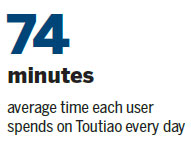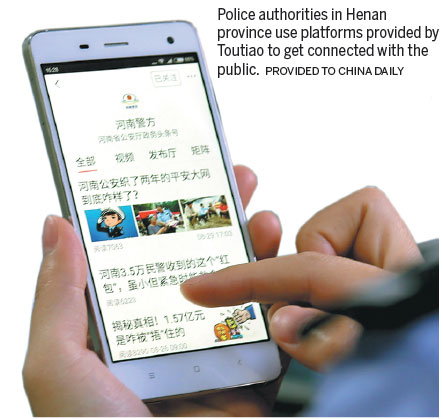Linking up for the next big thing
More local governments are partnering with content aggregation app Toutiao as part of efforts to upgrade their public services, amid a growing number of people accessing their news via smartphones.
In August, Beijing's Haidian district authorities opened an account for administrative headline news services via Toutiao. The move marked the first time for a district-level government in Beijing to run a news service offering more value-added functions by the company.
Chen Mingjie, director of the publicity department of the CPC Haidian district, said this move follows a significant media trend in the country for the government to adopt more advanced communication technologies to provide information in a timely manner.
The rise of smartphones and 4G networks has also fueled demand for new apps among users from top-tier cities to rural areas.
Xia Yong, editor-in-chief of Toutiao, said that Haidian district, with its rich technological, educational and financial resources, as well as abundant talent and channels for innovation, can effectively use Toutiao to generate more economic and social benefits for the public.

"Whether they are in the subway, office or home, as long as our users have their smartphones, they can access news and other information via our app. They do care about what happens in their environment. They are also keen to write their comments on various media platforms," Xia said.
Toutiao currently has 530 million users, including 55 million active users each day. Every day, each user spends an average of 74 minutes on the app.
Beijing is not alone. Shenzhen, Guangdong province, another top-tier city, also signed a strategic partnership framework agreement in July. Seventeen government branches, including the Shenzhen municipal public security bureau, have registered accounts for administrative headline news services.
Zhong Haifan, director of the Shenzhen Internet and Information Administrative Office, said that the partnership can help the city further expand its high-end industries in fields such as wearable devices, aerospace, intelligent equipment, gene sequencing and the low-carbon economy, as well as attract tourists and investment from the domestic and overseas markets.
Baidu, Alibaba and Tencent, three of China's IT giants collectively known as BAT, have become a phenomenon in the nation's Internet sector. A study by Chinese independent think tank Trigger Trend earlier this year said Toutiao may become part of the "next BAT", along with Meituan, a group purchasing site, and Didi, a car-hailing platform. The think tank cited investment in technological innovation, the talent pool and the growth curve as some of the reasons for the leap.

(China Daily 09/05/2016 page29)














